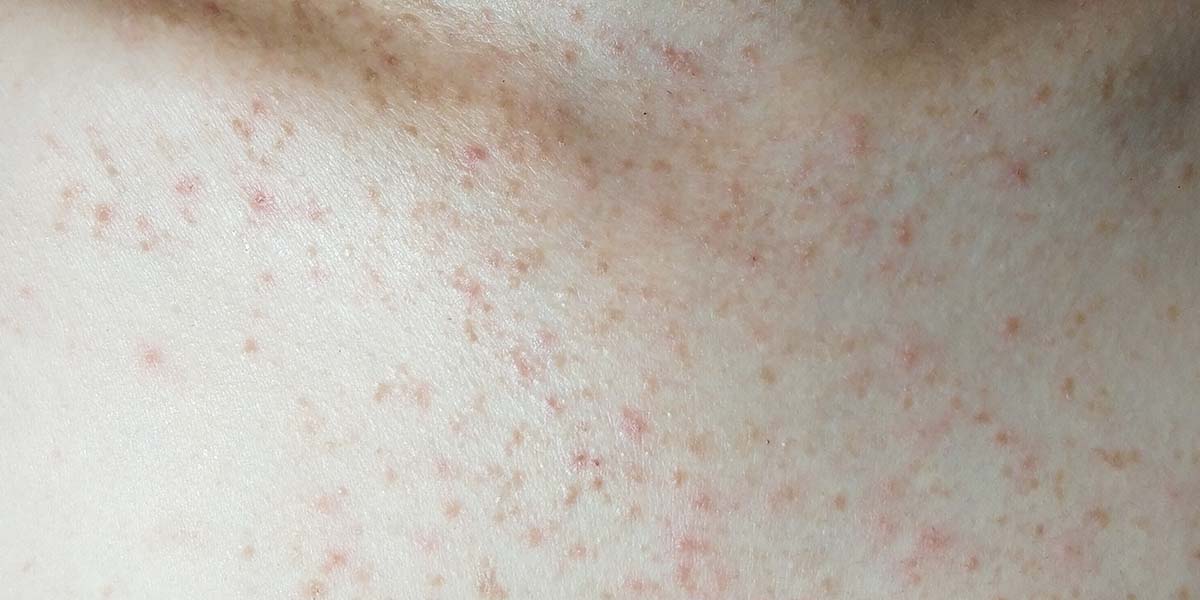Fungal skin infections can happen anywhere on your body. Most fungal infections are not dangerous, and you can usually treat them easily. They can often appear to be red, irritating and itchy, generally in the form of a rash.
What is a Fungal Infection?
Also known as mycosis, a fungal infection is a skin disease caused by a fungus. There are millions of species that make up fungi. They can live on household surfaces, on your skin, plants and in the dirt. They may also lead to skin problems like rashes or bumps.
What are the Most Common Fungal Skin Infections?
Ringworm of the body (tinea corporis)
Ringworm of the body is a skin infection caused by a fungus. The name comes from its appearance being the small, ring or circle shaped rash.

Athlete's foot (tinea pedis)
Athlete's foot is a contagious fungal infection that affects the skin on the feet. It can also spread to the toenails and the hands.
Jock itch (tinea cruris)
Jock itch belongs to a group of fungal skin infections called tinea. Jock itch is caused by mould-like fungi, which are known as dermatophytes.
Ringworm of the scalp (tinea capitis)
Ringworm of the scalp a highly contagious infection that affects the scalp and hair shafts. It is most common in toddlers and school-age children.

Tinea versicolor
The fungus interferes with the normal pigmentation of the skin, resulting in small, discoloured patches.
Cutaneous candidiasis
Cutaneous candidiasis often causes a red and itchy rash to form. Commonly found in the folds of the skin. This rash may also spread to other areas of the body.
Onychomycosis (tinea unguium)
Onychomycosis is a fungal infection of the nail. Symptoms may include white or yellow nail discolouration, thickening of the nail, and separation of the nail from the nail bed.

What is Fungal Acne?
Fungal acne is a type of infection in your skin's hair follicles. It most commonly appears as small pimples that do not vary much in shape or size, often along with itching. Fungal acne can cause whiteheads and skin irritation. It is often confused for acne vulgaris due to its similar appearance.

Is my Perioral Dermatitis Fungal?
One of the most common causes of perioral dermatitis is the overuse of topical steroid creams and inhaled prescription steroid sprays used in the nose and the mouth. However, perioral dermatitis may also be caused by Candida Albicans. Candida albicans is a yeast, which is a type of fungus that normally lives on the skin and inside the body.
The best way to help perioral dermatitis that may be caused by candida overgrowth is to think about your gut health. Of course, focusing on finding your trigger is very important.
Should I Apply Fungal Creams?
There are several types of antifungal creams available for a fungal rash. Sometimes an antifungal is used in conjunction topicals when two actions are required. For example, some medical professionals may prescribe an antifungal cream used with a mild steroid cream to help certain skin rashes. The theory behind this is that the antifungal cream will clear the infection, and the mild steroid cream reduces the inflammation caused by the infection. However, using a steroid cream can lead to topical steroid withdrawal.
We suggest using the AMPERNA® Soothing Duo with your anti-fungal cream. Our Soothing duo includes our Probiotic DS Soothing Serum, which is a no nasties steroid alternative, it has helped hundreds or people kick their topical steroid addiction.
How Can You Tell the Difference Between a Fungal and Bacterial Skin Issue?
A professional can identify the type of skin infection based on the appearance and location. They may closely examine any bumps and rashes whilst asking about your symptoms. A doctor may also use a skin biopsy to diagnose the skin condition.
Common Causes of Fungal Skin Infections
Fungal skin infections are caused by yeasts (such as Candida or Malassezia furfur) or dermatophytes. Dermatophytes comprise a large group of fungi including organisms in the genera Epidermophyton, Microsporidium, and Trichophyton. Many of these fungi’s only live on the outer layer of the epidermis and do not penetrate deeper.

What Should I do if I Think I Have a Fungal Infection?
We suggest seeing your local GP who can assess the fungal infection based on its appearance or through a skin biopsy. Once identified, your GP can then offer the best form of treatment.
Topical probiotic skincare like AMPERNA® helps calm and soothe irritated skin and also helps balance your skin microbiome. If you would like help with a regime specific to your skin concern, contact us. You may also like to sign up for Holistic Coaching.
Sources:
https://www.webmd.com/skin-problems-and-treatments/guide/fungal-infections-skin.


















